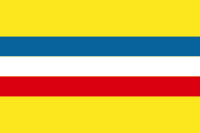Chinese Youth Party
| Chinese Youth Party 中國青年黨 | |
|---|---|
 | |
| Chairman | Wu Wenzhou |
| Founded | December 2, 1923 in Paris, France |
| Headquarters | 2F, No.61, Wenhua Rd., Douliu, Yunlin County, Taiwan (ROC) [1] |
| Ideology |
Chinese nationalism, Anti-communism, Conservatism |
| Website | |
| www.cct-tw.com | |
|
Politics of the Republic of China Political parties Elections | |
The Young China Party (YCP), also known as the Chinese Youth Party, (Traditional Chinese: 中國青年黨) is a minor political party in the Republic of China. Before the end of martial law, it was, with the Kuomintang and the China Democratic Socialist Party, one of three legal political parties in the Republic of China on Taiwan.
The Young China Party was founded by a group of Chinese students in Paris on December 2, 1923. Their name was inspired by the Young Turks. Given China's weakened condition in the early 1920s, the YCP's primary platform was to advocate the elimination of China's warlords and the establishment of a strong central government. It also promoted a nationalist agenda which focused on the abolition of the special privileges and extraterritoriality which foreign powers had obtained in China during the final years of the Qing Dynasty. It was also strongly anti-communist.
Tseng Ch'i (曾琦 Zeng Qi), the party's first chairman, and other YCP founders such as Li Huang (李璜), Ho Lu-tse (何魯之 He Luzhi) and Li Pu-wei (李不韙 Li Buwei) returned to China starting in 1924. The YCP then established party organizations in Shanghai, other major Chinese cities, and among overseas Chinese communities in Southeast Asia. From its foundation, the YCP's rank and file strength consisted mainly of students and intellectuals.
Initially called the China National Youth Corps, the YCP acquired its current name during its fourth national convention in September 1929. During the Northern Expedition, the party supported the northern warlords because they opposed the Communists within the First United Front. After the anti-communist purge, they still resisted the KMT because of its one-party state.
The party was banned after the Nationalists came to power in 1928 and the YCP refused Chiang Kai-shek's offer to merge the two parties. The Nationalists denounced them as a warlord party due to their early failed attempts to recruit Wu Peifu and their opposition to the Northern Expedition. The Communists called them fascists because their leaders had ties to a French fascist and their strident anti-communism. The YCP considered itself to be a conservative parliamentary democratic party.
They were based in Manchuria under the protection of Zhang Xueliang. After Japan's invasion of Manchuria in 1931, the YCP called for an immediate declaration of war, in contrast with the Nationalist government's resistance to a formal war declaration and initiating hostilities. The YCP joined the anti-Japanese United Front in 1937 to support the national government. After the initiation of the full-scale war, the YCP cooperated closely with the Kuomintang (KMT) in fighting Japanese military aggression. It joined the China Democratic League, an umbrella group of small democratic parties. In the early years of the war, the Youth Party became the third largest party, after the GMD and the CCP, yet one informed historian called the party organization "extremely weak." The members were either personal friends of Zhang Junmai, many of whom had been followers of Liang Qichao, or his former students. Qian Duansheng criticized Zhang as "neither an organizer himself not a man able to pick capable men to organize for him." John Melby, an American diplomat who knew Zhang during the war, felt that Zhang was as "unrealistic" as his brother, Chang Kia-ngau, was hard headed. As a scholar, Melby conceded, Zhang was "highly intelligent and well educated," but as a politician he was "utopian" and "ineffectual." [2]
In April 1945, one of the YCP's founders, Li Huang was appointed as one of the Republic of China's delegates to the San Francisco Conference at which the United Nations organization was created. The party left the CDL when it became pro-Communist after the war.
During the first nationwide general election in 1947, the YCP won more than 100 seats in the National Assembly (國民大會) and 16 seats in the Legislative Yuan. During the formation of the first cabinet of the constitutional government in 1948, the YCP's Ch'en Ch'i-t'ien (陳啓天) was appointed minister of commerce and industry, and party head Tso Shun-sheng (左舜生 Zuo Shunsheng) was appointed minister of agriculture and forestry.
After the 1949 communist revolution in China, many of the YCP's leadership and members moved overseas or relocated to Taiwan with the central government, though the YCP's headquarters were officially moved to Taipei only in 1969. The YCP cooperated closely with the KMT after 1949 and continually obtained seats in the National Assembly, Legislative Yuan and Control Yuan well into the late 1980s.
Given its intellectual foundations, the YCP placed great emphasis on periodicals and printed several reference books on party history and platforms. These include Brief History of the Young China Party, Biography of Past Members of the YCP, Fifty Years of the Young China Party and The Essay on Nationalism, all published in the early 1970s around the party's 50th anniversary. The YCP also published periodicals such as the fortnightly Democratic Tide, and the monthly the Modern Nation, National Tribune and Awakened Lion. For basic background on the YCP, please refer to the Republic of China 1987 - A Reference Book, published by the Government Information Office of the Republic of China.
In the 1990s, the party lost all of their seats and failed to gain elected representation after Taiwan's democratic transition.
See also
Notes
References and further reading
- Fung, Edmund S. K. (2000). In Search of Chinese Democracy: Civil Opposition in Nationalist China, 1929-1949. Cambridge; New York: Cambridge University Press. ISBN 0521771242.
| |||||||||||||||||||||
